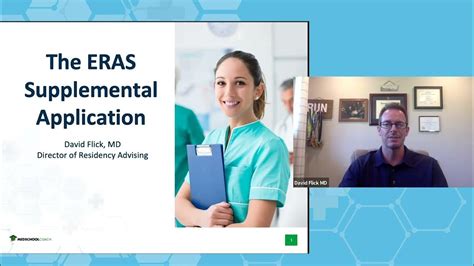The Electronic Residency Application Service (ERAS) supplemental application is a crucial component of the residency application process. It provides applicants with an opportunity to showcase their skills, experiences, and qualifications beyond the standard ERAS application. In this article, we will discuss five tips to help you make the most of your ERAS supplemental application.

Tip 1: Understand the Purpose of the Supplemental Application
Before you start working on your supplemental application, it's essential to understand its purpose. The supplemental application is designed to provide additional information about your qualifications, skills, and experiences that are not captured in the standard ERAS application. It's an opportunity to showcase your unique strengths and demonstrate how you can contribute to the residency program.
Tip 2: Review the Program's Requirements
Each residency program has its own set of requirements and guidelines for the supplemental application. It's crucial to review the program's requirements carefully to ensure you provide the necessary information. Some programs may require specific documents, such as a personal statement or a letter of recommendation, while others may ask for additional information about your research experience or clinical skills.

Tip 3: Highlight Your Strengths and Achievements
The supplemental application is an opportunity to showcase your strengths and achievements beyond the standard ERAS application. Highlight your research experience, clinical skills, and leadership abilities. Emphasize your achievements and accomplishments, and provide specific examples to demonstrate your skills.
Tip 4: Use Specific Examples and Anecdotes
When writing your supplemental application, use specific examples and anecdotes to demonstrate your skills and experiences. Avoid generic statements and clichés, and focus on providing concrete examples that showcase your strengths. For example, instead of saying "I'm a strong communicator," describe a situation where you effectively communicated with a patient or a healthcare team.

Tip 5: Proofread and Edit Carefully
Finally, proofread and edit your supplemental application carefully. A well-written and error-free application can make a significant difference in your chances of being selected for an interview. Ask a mentor or a colleague to review your application and provide feedback before submitting it.

In conclusion, the ERAS supplemental application is a critical component of the residency application process. By following these five tips, you can create a strong supplemental application that showcases your skills, experiences, and qualifications.






FAQs
What is the purpose of the ERAS supplemental application?
+The ERAS supplemental application is designed to provide additional information about your qualifications, skills, and experiences that are not captured in the standard ERAS application.
How do I know what to include in my supplemental application?
+Review the program's requirements carefully to ensure you provide the necessary information. Some programs may require specific documents, such as a personal statement or a letter of recommendation.
How can I make my supplemental application stand out?
+Use specific examples and anecdotes to demonstrate your skills and experiences. Avoid generic statements and clichés, and focus on providing concrete examples that showcase your strengths.
